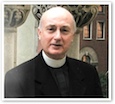Déjà vu all over again
- FATHER GEORGE W. RUTLER
When Lawrence "Yogi" Berra died last September at the age of ninety, he was remembered with true affection, not only for the kindness that wreathed his life, but also for his charming ways with the English language.
 He may have seemed like Sheridan's Mrs. Malaprop or Shakespeare's Dogberry when he confused words, as when he said that Texas has a lot of electrical votes, but his unique genre consisted in stating truths with guileless syntax. Others tried to invent Yogi-isms, goading him to say: "I didn't say half the things I said." His meaning was clear, grammar notwithstanding, as when he said that in autumn it gets late earlier.
He may have seemed like Sheridan's Mrs. Malaprop or Shakespeare's Dogberry when he confused words, as when he said that Texas has a lot of electrical votes, but his unique genre consisted in stating truths with guileless syntax. Others tried to invent Yogi-isms, goading him to say: "I didn't say half the things I said." His meaning was clear, grammar notwithstanding, as when he said that in autumn it gets late earlier.
When he said, "It's déjà vu all over again," some may have snickered, but that is the way with snobs. He was broaching a concept that the nineteenth-century Danish philosopher and theologian, Kierkegaard, explored in his considerations of "repetition" and "recollection." Basically, Yogi Berra and Søren Kierkegaard simply acknowledged, as all of us do one way or another, the role of the imagination in relation to time.
Perceptions of things past and to come are limited by our mortal intelligence, and memory can be as defective as prediction. In Christ, human and divine, there are no such limitations, so he has a perfect knowledge of past and future. Cynics have thought that his predictions came true only because later editors made them seem so. It should be no surprise, however, that Jesus as the Beginning and the End, should be able to know the Father's will and foresee its consequences.
The accounts of Matthew, Mark and Luke stress the chronology of Christ's earthly life, while John declares its meaning. It is like the difference between a photograph and a portrait, each conveying personality, but in different ways. Most likely, Jesus cleansed the Temple at the end of his earthly life, but John mentions it at the beginning of his narrative as a foretaste of what Christ would do, just as when I was a boy, I opened the Cracker Jack box from the bottom to get the little prize first. Our Lord hints at the future by showing the Magi his divinity, and exposing the Trinity at his baptism, and letting heaven break through in his Transfiguration.
His miracles are "signs" by which the Lord prepares his Church for what is to come. He recollects seven of them, as a kind of repetition of the seven acts of the world's creation, of which he has a perfect memory. It is not that John was confused about the order of events. He was inspired to know that the events were ordered. The Incarnation of the Eternal Word is déjà vu all over again. "And now I have told you before it comes to pass: that when it shall come to pass, you may believe" (John 14:29).
 This is Meaghen Gonzalez, Editor of CERC. I hope you appreciated this piece. We curate these articles especially for believers like you.
This is Meaghen Gonzalez, Editor of CERC. I hope you appreciated this piece. We curate these articles especially for believers like you.
Please show your appreciation by making a $3 donation. CERC is entirely reader supported.

Acknowledgement
 Father George W. Rutler. "Déjà vu all over again." From the Pastor (January 24, 2016).
Father George W. Rutler. "Déjà vu all over again." From the Pastor (January 24, 2016).
Reprinted with permission of Father George W. Rutler.
The Author
 Father George W. Rutler is the pastor of St. Michael's church in New York City. He has written many books, including: The Wit and Wisdom of Father George Rutler, The Stories of Hymns, Hints of Heaven: The Parables of Christ and What They Mean for You, Principalities and Powers: Spiritual Combat 1942-1943, Cloud of Witnesses — Dead People I Knew When They Were Alive, Coincidentally: Unserious Reflections on Trivial Connections, A Crisis of Saints: Essays on People and Principles, Brightest and Best, and Adam Danced: The Cross and the Seven Deadly Sins.
Father George W. Rutler is the pastor of St. Michael's church in New York City. He has written many books, including: The Wit and Wisdom of Father George Rutler, The Stories of Hymns, Hints of Heaven: The Parables of Christ and What They Mean for You, Principalities and Powers: Spiritual Combat 1942-1943, Cloud of Witnesses — Dead People I Knew When They Were Alive, Coincidentally: Unserious Reflections on Trivial Connections, A Crisis of Saints: Essays on People and Principles, Brightest and Best, and Adam Danced: The Cross and the Seven Deadly Sins.


